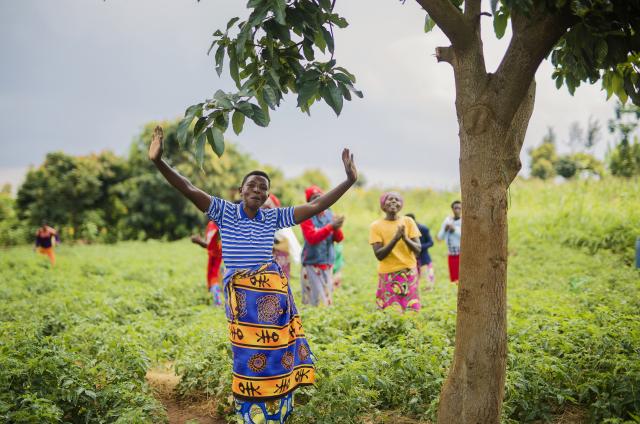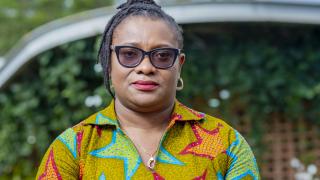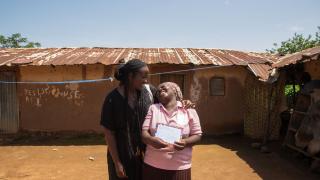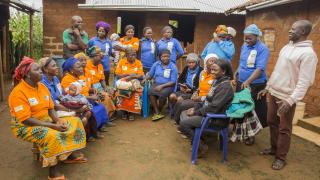My Name is Saratu
Saratu has faced down fear many times. She and her husband, both farmers, once lived in Maiduguri in Borno State. But a single day was all it took to uproot and unravel their lives.
We heard gunshots and then people started to run in different directions. We ran out and hid ourselves.
Out of sight and from afar, Saratu and her family hid and watched as Boko Haram set their house ablaze. She watched the home she and her husband had worked so hard for go up in flames as the extremists marched onward and burned down the surrounding neighbours' homes.
And then they came for the people. Helpless, distant, and thinking of her family, Saratu watched as Boko Haram slaughtered her friends and neighbours.
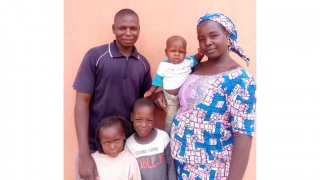
We were fortunate to have been alive, and our hiding place not discovered because we would also have been killed.
Saratu and her family held onto what luck they could, as they found people from Tafawa Balewa in Bauchi State who were on their way back home. The travelers assured Saratu that their community was safe and invited Saratu’s family to join their journey back. Luck stayed with her family, Saratu’s husband ran into a friend who offered them shelter.
But trouble wasn’t far behind: another crisis befell Saratu and her family in their new home. “Even though our house was not burned, we had to run away from home for a day and returned when normalcy was restored. The presence of military personnel helped to bring some calm to the community,” Saratu explained.
Calm did not promise stability, as Saratu and her husband faced financial difficulty. “I used to make bean cakes to sell as a means of generating income but as a result of how difficult things had become, there was hardly enough money for us to eat, meet other needs in the family and maintain a business,” Saratu said. “We depended on the little business my husband does and then we would sell a little of our farm produce when things became too difficult for us.
When I heard that an NGO was in my community to support women survivors of war with business skills and financial support and the knowledge to grow their businesses, I prayed to God to be selected because I knew I fit the profile.
Saratu’s prayers were answered. As she entered Women for Women International’s programme, she began planning how to restart her business, support her husband, and to begin another enterprise of selling good quality used clothes.
Three months into the programme, Saratu was able to reopen her business selling steamed bean cakes thanks to the support from her training stipend and was able to buy new clothes for her children. By her sixth month, Saratu had joined a village savings and loan association with other women in her group. “We save money, give out loans to improve our businesses, and support one another in difficult times. I feel so empowered that I can now save some money for my family’s future.”
Saratu learned more than just how to do good business: she has gained a new perspective on gender, her rights, and health and hygiene.
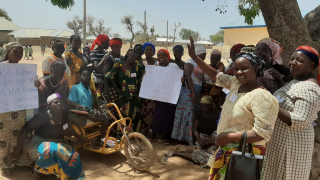
I am learning a lot from my training sessions, which have changed my outlook about some of our practices. For example, treating my children equally regardless of gender.
"Our traditional practices ensure that boys are taught at a very tender age that they are superior to girls because they continue the family name. But after my training sessions on the gender division of labour, I realised the importance of raising my son to do simple chores that make sense for his age.”
Saratu added, “To my surprise, he enjoys working with his sister.”
Her husband has also learned to reevaluate his own assumptions about gender roles through his participation in Women for Women International’s Men’s Engagement Programme. “After attending a few meetings, he told me that he never knew men were supposed to assist their wives in household chores. He now believes that our traditions are responsible for men’s behaviour towards their wives.”
What Saratu and her husband have learned about gender roles and rights will leave a long-lasting impact on their family that goes beyond household chores. “I was very surprised when he said he learned that women are supposed to be included in the sharing of inheritance. Although, he admitted it would not be an easy decision to embrace,” she said. “I look forward to seeing his decision on the issue of women inheriting.”
She has taken to heart the lessons from her health & wellness training and used it to improve the life of her family.
“I have a deeper knowledge of how to keep myself healthy and in turn take care of my family. Before, we ate whatever was available just to ensure that our stomachs are full and no one is hungry but now, I practice good nutrition by carefully planning out my family’s meals even before I cook to ensure that each meal comprises of different food groups.
“I have now come to realise that it is safer and more cost effective to go to the hospital when I am sick, or any member of my family is not feeling well. Recently, my eldest son and his sister were sick, so I took them to the hospital, and they are better now. I felt very proud of myself for going to the hospital instead of treating them with herbs as I would have done in the past. Thanks to Women for Women International, my family is healthier,” Saratu said.
In early 2020 a new enemy — now invisible — neared Saratu’s home in Bauchi State as she progressed through the programme. This time, Saratu could prepare to protect herself and her family from a new threat: COVID-19.
“In the village where we live, it is not uncommon to see children and sometimes adults eat without washing their hands, but I have learned that dirty hands are the easiest and fastest way germs and diseases spread from one person to another,” Saratu said of her lessons about how health and hygiene are connected to disease. “I have taught my children to wash their hands properly before and after eating."
Through proper sensitisation by my trainer, I received adequate information about the COVID-19 virus which is affecting everyone globally. I was taught proper handwashing techniques using soap and water as well as using hand sanitisers when soap and water are not available.
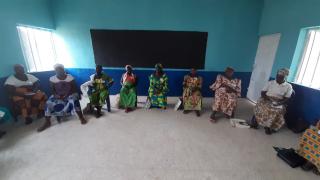
With new knowledge about the strain of coronavirus constantly being released, Women for Women International trainings have been crucial in dispelling misinformation and educating women on real measures that will protect them and their community.
“It was from the awareness training that I came to understand that some of the information we heard earlier was untrue. For example, we heard the virus does not affect people who live in tropic regions; we can pray to ward off the effect of the virus on our community, etc,” she said. “Our trainer also emphasised social distancing as a means of preventing ourselves and loved ones from contracting the virus.”
While in-person training has paused for the safety and health of Women for Women International’s participants, women continue to use what they’ve learned and practice hygiene and social distancing at home. “At home, we frequently wash our hands with soap and water, and I no longer visit friends because I am protecting myself and my family the best way I can.
At my church, services have been reduced to different batches at different times since we usually have large gatherings. The group I belong to at church now meets in an open space or a large house with just 15 persons from the same street attending. Market activities have reduced to the very barest minimum as most people who used to bring grains from other communities to sell in my community do not come any more for fear of contracting the virus.”
As for many people around the world, reduced market activities have been a double-edged sword. Despite Saratu’s business success applying lessons from the programme, government closures, and widespread fear of the disease have affected demand for her steamed beans. A total government lockdown made the difficult choice for Saratu to halt her business, leaving her husband as the sole source of income as an “okada rider,” or motorcyclist.
“Life is becoming more difficult as people do not go out to engage in income-generating activities like they used to do before COVID-19,” Saratu explained. “The fear of most people is that soon, the food that families have stored up to eat will no longer be enough to feed them. So while people protect themselves from the virus, hunger sets in gradually and forces them to leave the safety of their homes to search for food.”
Financial dangers feed into other ones, especially for women. Saratu shared, “Domestic violence in my community is gradually on the rise as men are frustrated at being idle and not making money. Men are becoming easily irritated when their wives ask for money because they expect them to understand the situation, whereas their wives are innocently asking for money to take care of the family’s needs. The tension has resulted in severe verbal abuse from the men most times.”
Though Saratu and her family are dealing with challenges once more, she draws strength from her knowledge and hope for the future. “I miss my trainings with Women for Women International. I miss my association with other women, sharing our lives’ experiences and learning new topics. But for now, it is best that we all maintain social distance for the sake of our health and our lives.
We hope and pray that this pandemic will come to an end so that our lives and activities can return to normal.
Learn more about our work in Nigeria
Our Country Director in Nigeria, Buki Onyishi, speaks out on the pandemic that has plagued her country for so many years: sexual violence.
Messages of hope from Nigeria
subtitle:
The power of sisterhood in action offers an important reminder: tough times don't last.
Zainab Gbobaniyi is a lawyer and advocacy trainer with Women for Women International. Here she tells us about her life-long passion for women's rights and how she's working to give marginalised women a voice.

